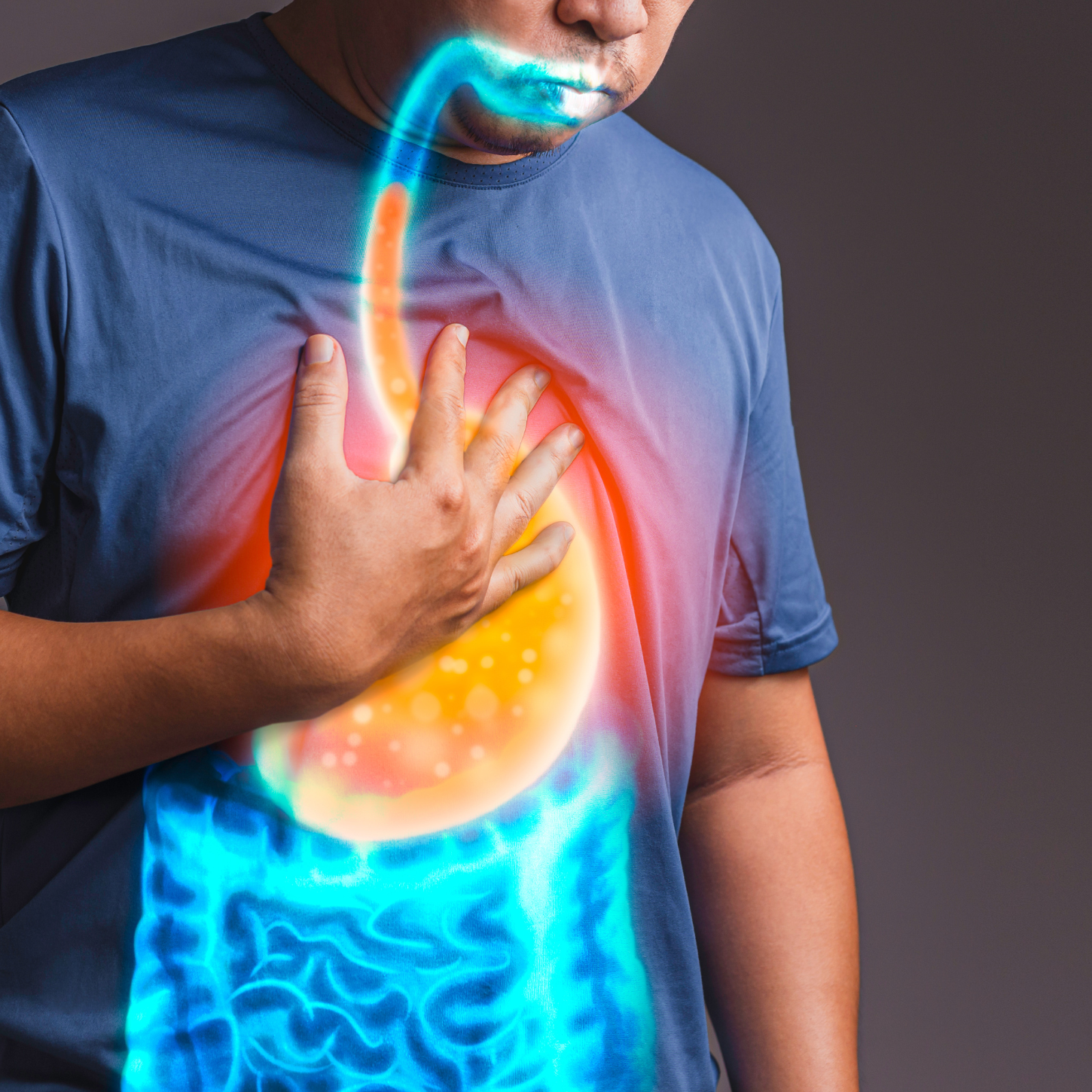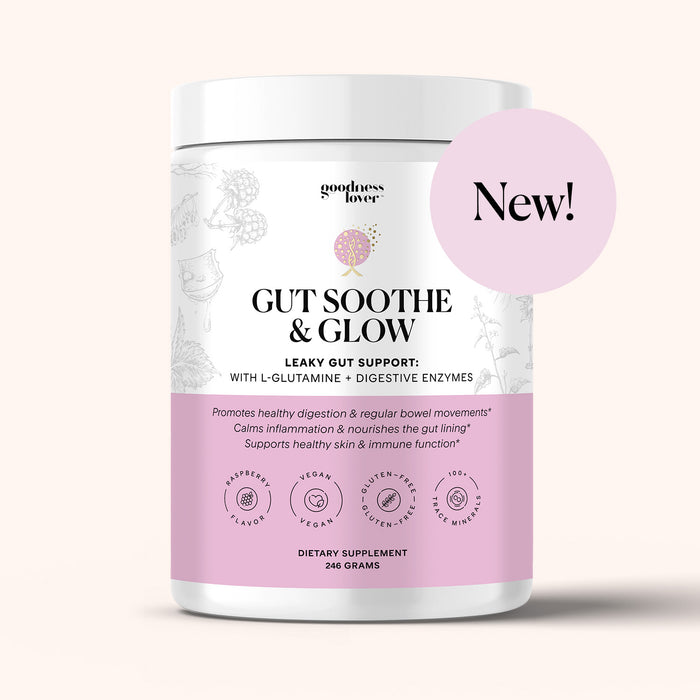Are you tired of that pesky fire-breathing dragon in your chest that seems to awaken every time you indulge in your favorite spicy taco or that irresistible square of smooth milk chocolate?
Well, you're not alone.
This fiery foe, better known as acid reflux, is a common condition that affects many people worldwide. In fact, reflux affects 1 in 5 adults in the developed world!
Acid reflux is a sneaky little gremlin that sends stomach acid on a joyride back up into your esophagus, causing discomfort and a rather unpleasant burning sensation.
Ignoring this unwelcome intruder can lead to more serious health issues over time, such as chronic heartburn, esophagitis, and even esophageal cancer.
So, it's high time we showed this fiery foe the exit door, don't you think?
But before you start envisioning a life devoid of all your favorite foods, let me assure you, there's no need for such drastic measures. Treating acid reflux doesn't necessarily mean bidding adieu to all things flavorful. In fact, there are numerous natural remedies and lifestyle changes that can help keep acid reflux at bay, allowing you to enjoy your meals without the fear of triggering an internal volcanic eruption.
So, buckle up as we embark on a journey to douse the flames of acid reflux, naturally and effectively. From dietary changes and herbal remedies to stress management and sleep habits, we'll explore a variety of natural strategies to help you reclaim your life from the clutches of acid reflux.
Let's dive in, shall we?
Table of Contents:
What Is Acid Reflux?
To effectively combat our fiery foe, we first need to understand what we're dealing with. Acid reflux, also known as gastroesophageal reflux disease (GERD), is a condition where stomach acid, and sometimes bile, makes an unwelcome journey back up into your esophagus, the tube that connects your mouth to your stomach. This backward flow can irritate the lining of your esophagus, causing discomfort and a host of other symptoms.
For some, the symptoms of reflux and indigestion may only be mild, with only a slight uncomfortable sensation in the stomach or the occasional regurgitation. For others, the pain can be more severe and really impact their quality of life. And even if your symptoms are mild, your body may still be suffering damage.
Common symptoms of acid reflux include:
- A burning sensation in your chest (heartburn), usually after eating, which might be worse at night
- Regurgitation of food or sour liquid
- Difficulty swallowing
- Bloating
- Bloody or black stools
- Nausea and vomiting
- Burping
- Wheezing, dry cough
- Weight loss for no reason
- Disrupted sleep
- Dysphagia — the sensation of food being stuck in your throat
Acid reflux involves hypo-functioning of the digestive system, meaning that you’re not digesting well enough. Contrary to what a lot of folks say, it is not typically too much stomach acid, but actually not having enough.
There is a sphincter between your esophagus and your stomach which opens and closes and is supposed to keep the contents of the stomach from moving back up the esophagus. This sphincter works by direct feedback from having sufficient acid production.
If there is sufficient stomach acid, then the sphincter tone increases. However, if the stomach acid is low at the point in time when food enters the stomach, the tone of this sphincter is weakened and unable to keep the stomach contents in the stomach, leading to the symptom of acid reflux. Not having enough acid can lead to yeast overgrowth, leaky gut, bacterial and parasitic infections, small intestinal bacterial overgrowth and nutrient deficiencies.
Common Causes of Reflux
There are various factors that can contribute to this condition. These include:
- Obesity
- Pregnancy
- Hormonal imbalances
- Anxiety and stress
- Poor eating habits — eating too fast or overeating
- Dietary irritants
- Hiatal hernia
- Slow gastric emptying
- Alcohol or smoking
- Helicobacter Pylori infection
- Damage to the gut microbiome
- Congenital structural weakness with lower esophageal sphincter (LES)
- Use of certain medications such as calcium channel blockers, theophylline (bronchodilators), nitrates and antihistamines
Conventional Treatment
The conventional way to tame this fiery foe is through medications and, sometimes, surgery. Antacids, the superheroes of the pharmacy aisle, swoop in to neutralize the stomach acid, providing quick relief. But when the reflux proves to be stubborn, doctors bring in the big guns - H2 blockers or proton pump inhibitors (PPIs), like Nexium, Aciphex, Prilosec, Prevacid, Protonix, and Kapidex.
PPIs are one of the most widely used drugs in the world. They are available over the counter and are recommended with little to no testing. They are like the bouncers of your stomach, blocking its ability to produce acid. No acid, no reflux, no symptoms, right?
Well, not quite.
While PPIs might seem like the perfect solution, recent studies have shown that they might be more of a double-edged sword. Long-term use of PPIs can lead to a host of issues, from reducing your body's absorption of essential vitamins and minerals (leading to conditions like bone fractures) to causing gut dysbiosis (PPIs may cause even more changes in the gut microbiome than either antibiotics or other drug use!), increasing your risk for food poisoning and infections, and even potentially increasing your risk for stomach cancer and dementia!
Moreover, PPIs (and H2 blockers) are like putting a band-aid on a bullet wound - they manage the symptoms but don't address the root cause. In fact, they can even make the reflux worse in the long run.
So, if you're currently on PPIs and are considering other options, the key is weaning off them slowly under the guidance of your health practitioner, while implementing some of the natural practices we'll discuss below and in our next article.
Lifestyle Changes
Exercise
When it comes to extinguishing the fire, lifestyle changes can be your secret weapon.
Let's start with exercise. Shedding those extra pounds and lowering your BMI can significantly help your body reduce abdominal pressure, a key culprit behind reflux and heartburn. This pressure is often amplified by excess body weight.
However, it's important to note that not all exercises are created equal when it comes to acid reflux. Your workout routine can either be a friend or a foe, depending on the type of exercise and how you care for your body pre and post-workout. Some exercises can reduce blood flow to your gastrointestinal region, causing gastric fluids to accumulate and leading to inflammation and irritation. Certain body positions during exercise can also exert pressure on your stomach and chest, potentially triggering acid reflux symptoms. Moreover, inhaling air rapidly during high-intensity workouts may relax the lower esophageal sphincter, pushing acid into the esophagus.
To navigate this, opt for low-impact exercises like cycling or a brisk walk. These can help alleviate reflux symptoms without exacerbating them at the same time.
Stop smoking
Kicking the smoking habit is a significant step towards managing acid reflux. Smoking can interfere with the functioning of your lower esophageal sphincter (LES). Nicotine, a key component of tobacco, is known to relax the LES, allowing stomach acid to escape into the esophagus, causing heartburn and other acid reflux symptoms. Additionally, smoking reduces the production of saliva, which plays a crucial role in neutralizing stomach acid and washing it away from the esophagus. Quitting smoking can go a long way in reducing the frequency and severity of acid reflux episodes.
Reduce alcohol intake
Another bad habit to kick to the curb is excessive alcohol intake. For some people, any amount of alcohol may cause symptoms. Again, alcohol can cause the LES to relax, allowing stomach acid to escape into the esophagus, leading to acid reflux. Additionally, alcohol can stimulate the production of stomach acid, further contributing to symptoms. It's also worth noting that certain alcoholic beverages, such as wine and beer, can increase the acidity of your stomach contents, potentially leading to more severe reflux symptoms. Therefore, limiting alcohol intake can be a crucial step in managing acid reflux.
Improve your sleep and manage your stress
Lastly, never underestimate the power of a good night's sleep and stress management. Poor sleep or high stress can exacerbate acid reflux symptoms. It's like adding fuel to the fire. So, ensure you're getting enough shut-eye and incorporating stress management techniques like meditation, yoga, or deep breathing exercises into your routine. Also, avoid eating 2-3 hours before bedtime, and elevate the head of the bed if suffering reflux when you lie down.
Try acupuncture
Acupuncture, an ancient Chinese medical practice, has been gaining recognition in the Western world for its potential benefits in various health conditions, including acid reflux. The practice involves inserting thin needles into specific points on the body, known as acupuncture points. According to traditional Chinese medicine, this helps balance the flow of energy or life force, known as "qi" (pronounced "chee"), through pathways in your body called meridians. In the context of acid reflux, acupuncture is believed to work by stimulating these points to balance the digestive system and regulate the functions of the stomach and esophagus. Acupuncture may help reduce symptoms of acid reflux by modulating the acid secretion, improving muscle function in the gastrointestinal tract, and enhancing gastric motility. Some studies have shown it to be superior to medication in alleviating symptoms of reflux!
Where Does This Leave Us?
Don’t worry, I’m not going to leave you in the dark. In our next article, we are going to explore some of the dietary changes you can make and introduce you to a host of natural remedies which will extinguish that fiery foe before you can say, "Heartburn be gone!"
So, stay tuned as we continue our journey towards a reflux-free life. Remember, the power to extinguish the fire lies not just in a pill bottle, but in the choices you make every day. So, get ready to take control and say goodbye to that fiery foe once and for all!
Recipe Spotlight: Chamomile and Fennel Infused White Bean Stew
This unique culinary creation combines the gentle essence of chamomile and the earthy notes of fennel to create a comforting and nourishing dish that will surely captivate your taste buds.
The white beans of this stew provides a significant source of plant-based protein, fiber, and essential minerals. The combination of protein and fiber in white beans can help stabilize blood sugar levels, making this stew an excellent choice for those managing their blood glucose.
Add in chamomile which is known for its anti-inflammatory and antioxidant properties, and fennel which is a great source of vitamin C, this recipe is packed with health benefits! Enjoy this nourishing journey to well-being!

















What Do You Think? Comment Below: